to
Sara Lindsey
who has won a copy of Nicola Cornick’s THE LAST RAKE IN LONDON
and
who has won a copy of Nicola Cornick’s UNMASKED.
Please email riskies@yahoo.com to claim your prizes.
The Riskies
to
Sara Lindsey
who has won a copy of Nicola Cornick’s THE LAST RAKE IN LONDON
and
who has won a copy of Nicola Cornick’s UNMASKED.
Please email riskies@yahoo.com to claim your prizes.
The Riskies
One can study history, and read memoirs and letters, and devour historical novels by the bushel…and yet I find there are still some aspects of how people really lived and thought which it is hard for a modern person to really thoroughly understand.
Oh, one can have an intellectual understanding — but I mean a gut understanding, a real “feeling” for the way people lived, and thought — an ability to mentally step into their shoes, and see through their eyes.
A few areas that I think are particularly difficult for a modern person to truly grasp: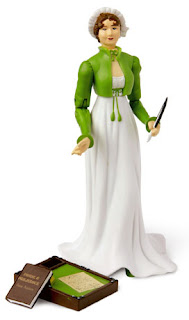
1) Just how different the attitude toward STUFF was. Nowadays, we have far too much stuff — we’re inundated by it, our homes overflow with it, we complain our kids have way too much junk… We have Jane Austen action figures and joke mugs just for the heck of it, our kids get cheap toys in cereal boxes and at the doctor, charities and realtors send us free notepads and coins and calendars and bumper stickers and postcards…
So how can we truly grasp a world where stuff actually cost money? Where things were used and reused and reused again? Where the Artful Dodger could hang for stealing a handkerchief, because handkerchiefs were actually worth something?
2) And how can a modern person raised in a democratic, multi-ethnic society ever entirely comprehend the mindset of a person who never (or rarely) met anyone who wasn’t a supporter of monarchy, whose whole society believed that men were smarter than women, that aristocrats had superior blood and brains to commoners, that people’s abilities were determined by their race and national origin?
 3) And how do we, living in a world with good contraception, where women can support themselves (and their children, if need be) by working as a lawyer or doctor or police officer or computer programmer — a world that has heard from Gloria Steinem and Betty Friedan and Oprah and Jennifer Crusie and The Joy of Sex — how do we get into the mindset of people who thought a woman’s chastity, modesty and “virtue” were her crown jewels, and who thought a woman’s duty was to obey her husband in the same way her husband obeyed the king?
3) And how do we, living in a world with good contraception, where women can support themselves (and their children, if need be) by working as a lawyer or doctor or police officer or computer programmer — a world that has heard from Gloria Steinem and Betty Friedan and Oprah and Jennifer Crusie and The Joy of Sex — how do we get into the mindset of people who thought a woman’s chastity, modesty and “virtue” were her crown jewels, and who thought a woman’s duty was to obey her husband in the same way her husband obeyed the king?
Anyway, these are three areas that occur to me right off. Which of these seem hardest to you? Or what other things do you think are particularly hard to grasp?
All answers welcome!
Cara
Cara King, whose brain isn’t hampered at all by its common blood
You have won a copy of A MOST UNCONVENTIONAL MATCH by Julia Justiss.
Please email riskies@yahoo.com to claim your prize.
The Riskies
I don’t know much about the Battle of Waterloo (every Regency I’ve written has been set earlier, so I’ve never bothered to study it much). So as my part of the Risky Regencies Waterloo week, my post today will talk about the evolution of my cavalry hero in MY LADY GAMESTER — what choices I faced in creating him, and how I worked to weave my research into the story.
I decided early in the planning of this novel that my hero (Lord Stoke, once known as Captain Stanton) was to be an ex-military man. And yes, this concept is quite common in Regency romances — the hero a younger son, career military, who never expected to inherit the title — but this concept is used a lot because it works so well. Talk about conflict! You have a man who is not what he appears to be; you have a fish out of water; you have a man with different priorities, values and tastes than many of the folks now around him.
After deciding Lord Stoke had been an army man (as navy didn’t fit his backstory), I quickly decided he had to be cavalry, as horses would be one of the things that drew him and the heroine together (and also created major problems.)
So then it was: what kind of cavalry? I read a bunch of Haythornthwaite books (some pictured here) and talked to my Trusty Todd (patent pending), and concluded that light cavalry seemed to do more fun things and have a better reputation for usefulness at this point than heavy cavalry, and heavy horses wouldn’t work anyway — so light cavalry it was.
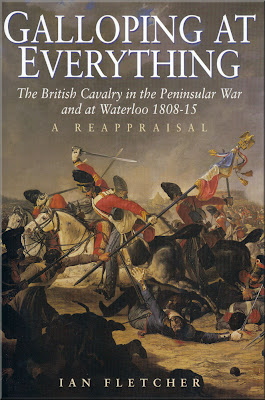 Next decision: the year, and the hero’s military past.
Next decision: the year, and the hero’s military past.
I needed the Napoleonic Wars to still be going on (poor Stoke, away from the fighting and feeling useless!), but I also needed for a cavalryman who had sold out a year before to have been in the field for several years, and taken part in a few major battles in which light cavalry were involved, and in which there had been a fair number of casualties.
I concluded that Talavera (July 1809, which used two light cavalry brigades) would work for the major battle in which Stoke’s best friend, the redheaded scamp Basty, was wounded…and Albuera (May 1811, one light cavalry battalion) would be suitable for the battle in which poor Basty finally died. So the year of my novel became 1812.
I then studied up on Talavera and Albuera, and also lots of general cavalry and army stuff (their weapons, their tactics, how they trained their men and horses — that sort of thing.)
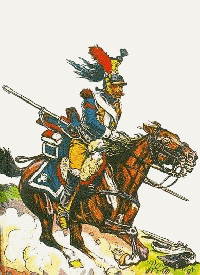 And of course, all along, Trusty Todd was at hand to help clarify the differences between a musket, a carbine, and a pistol, to explain what exactly happened when a firearm “misfired” (and to remind me frequently that the Armies of Wellington were kept up the Sleevies of Wellington…)
And of course, all along, Trusty Todd was at hand to help clarify the differences between a musket, a carbine, and a pistol, to explain what exactly happened when a firearm “misfired” (and to remind me frequently that the Armies of Wellington were kept up the Sleevies of Wellington…)
The final hurdle, of course, was writing the scenes in which Stoke explained the battles and their personal significance to my heroine…trying to be clear and correct without boring the reader in the least. Ah, yes, the simple joys of authorhood.
And the end result? See what you think: here’s part of the section in which Stoke tells Atalanta what happened at Talavera:
The memories were perfectly clear. “We were in the middle of a charge, but something had gone wrong. I think the scouts had been misled as to the enemy’s strength. Hard to tell.”
He paused, seeing the smoke and mud all about. “Their artillery had taken a hard toll on us–we didn’t realize how much until after it was all over. But it was obvious that we were disorganized. Sebastian was to my right, on Minerva. We hit the French cavalry hard.”
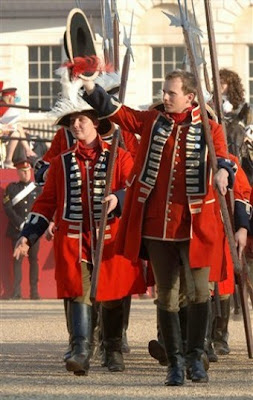 He shook his head. “It’s impossible to describe what it’s like, being in the middle of a battle. You can rarely see more than what’s right in front of you. You have a saber slashing down at you, and if you’re lucky, you get there first, or deflect it. Then you strike back, fast. If you succeed, there’s already another horse upon you, another saber, or occasionally a pistol pointed at your chest.”
He shook his head. “It’s impossible to describe what it’s like, being in the middle of a battle. You can rarely see more than what’s right in front of you. You have a saber slashing down at you, and if you’re lucky, you get there first, or deflect it. Then you strike back, fast. If you succeed, there’s already another horse upon you, another saber, or occasionally a pistol pointed at your chest.”
He stared up into the peaceful trees. “All you can hear is the shouting at a charge, the guns, the artillery. The screaming. And there’s smoke all over. It gets in your nose, in your eyes. Dirt, mud. Blood. Horses falling all around.”
But this wasn’t what he’d meant to say. “On top of everything, it was foggy that day. It looked like the plains of hell. Out of nowhere came a French dragoon, his sword covered with blood. He slashed Sebastian before I could shout a warning.”
She gave a distressed cry. “Was he all right?”
He rubbed at the tension in his forehead. “A saber in the face is never a pretty sight. God knows, we disfigured plenty of French, so it was no surprise. But he was all right, yes. Thanks to his mount.”
And…that’s my story!
So…what Regencies have you read where you thought the military stuff was done particularly well?
All answers welcome!
Cara
Cara King, author of MY LADY GAMESTER, a more poetic title than MY LORD DRAGOON
 When the Riskies asked me to guest blog during their Waterloo Week, I was excited. There were so many things I could write about.
When the Riskies asked me to guest blog during their Waterloo Week, I was excited. There were so many things I could write about.
I could write about the events of the battle, and its impact on world history.
I could write about the nature of Napoleonic combat–the three arms of infantry, cavalry, and artillery, and the weapons they used; how those weapons affected the tactics of the battle; how Marshal Ney’s attacks illustrated the imperviousness of infantry squares to cavalry, and how the defeat of the Imperial Guard demonstrated the superiority of line over column.
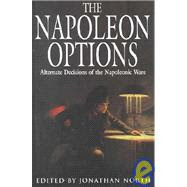
I could write about the decisions that were made, how Napoleon might have won the battle, and what the likely consequences would have been.
But then a sobering thought occurred. In a rare moment of self-reflection, I suddenly wondered: “Why do I know about this stuff?!”
I mean, I’m a peaceable guy. I’ve never served in the military. I’ve never used a weapon in anger. I’m not a historian, or a historical novelist. Heck, I don’t even play one on TV. And yet I’ve done many, many hours of research, read countless books, visited innumerable museums. Why? Just for fun? Am I a mutant, or what?
No, I’m not a mutant. The truth is much worse than that: I’m a guy. And what’s more, I’m not alone in this. The world is filled with guys. And we guys, insofar as we like to read at all, like to read about war, weapons, and general mayhem.
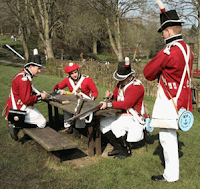

That explains those men who spend a fortune on period costumes and weapons and drive hundreds of miles to line up in the hot sun and recreate important battles of history.
It explains the wargamers who argue for hours about the relative merits of chain mail versus plate armor, and whether or not a halberd is a purely offensive weapon.
It explains why a quick glance at my bookshelves turned up 102 books on military history, books on dueling, drill manuals and period fencing books. And it explains why I have precise knowledge of how to load and fire a flintlock musket, of the differences between smallswords and spadroons, and of the different kinds of shot used in a man-of-war, but only the vaguest idea of how to change the oil in my car.
 Why this fascination? Is it in our genes, inherited from our primitive, warlike ancestors, who fought for recognition, territory, and to pick up chicks (perhaps literally)?
Why this fascination? Is it in our genes, inherited from our primitive, warlike ancestors, who fought for recognition, territory, and to pick up chicks (perhaps literally)?
Is it the appeal of military virtues like courage, discipline, duty, camaraderie, and honor?
Is it the fancy uniforms, the deadly weapons, the glittering array, and the idea that somehow these will help us to pick up chicks?
Or is it the very horror of the battlefield–the closest thing mankind (and I do mean mankind) has devised to hell on earth? Sometimes a thing is so terrible that it is hard to look away even at hundreds of years’ remove.
The truth is, I don’t know why I’m fascinated, but I am. I don’t watch football. I don’t drink beer. I don’t do stupidly risky things to impress girls (at least, not anymore). I like fluffy kittens, and Notting Hill is one of my favorite movies. Be that as it may, I’m still a guy. I quote from Sun Tzu’s Art of War, and I flip to The History Channel to look for reruns of Conquest and Mail Call (which could equally be called Male Call). And the story of Waterloo grips me: the bravery, the excitement, the terror, the discipline, the suffering, and the death. It brought in a new era then lasted nearly a hundred years, finally ending on another battlefield in Belgium. It’s war; and, like it or not, it’s part of who we are.
Todd-who-also-knows-how-to-row-a-trireme-and-couch-a-lance
